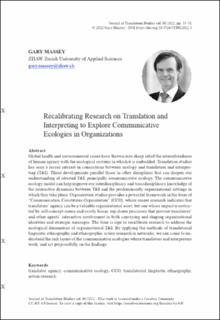Please use this identifier to cite or link to this item:
https://doi.org/10.21256/zhaw-25153| Publication type: | Article in scientific journal |
| Type of review: | Peer review (publication) |
| Title: | Recalibrating research on translation and interpreting to explore communicative ecologies in organizations |
| Authors: | Massey, Gary |
| et. al: | No |
| DOI: | 10.3726/JTS012022.3 10.21256/zhaw-25153 |
| Published in: | Journal of Translation Studies |
| Volume(Issue): | 2 |
| Issue: | 1 |
| Page(s): | 33 |
| Pages to: | 51 |
| Issue Date: | 2022 |
| Publisher / Ed. Institution: | Peter Lang |
| ISSN: | 2673-6926 2673-6934 |
| Language: | English |
| Subjects: | Translator agency; Communicative ecology; Translatorial linguistic ethnography; Action research; Translation; Communicative constitution of organisations (CCO); Interpreting |
| Subject (DDC): | 418.02: Translating and interpreting |
| Abstract: | Global health and environmental crises have thrown into sharp relief the interrelatedness of human agency with the ecological systems in which it is embedded. Translation studies has seen a recent interest in connections between ecology and translation and interpreting (T&I). These developments parallel those in other disciplines that can deepen our understanding of situated T&I, principally communicative ecology. The communicative ecology model can help improve our interdisciplinary and transdisciplinary knowledge of the interactive dynamics between T&I and the predominantly organizational settings in which they take place. Organization studies provides a powerful framework in the form of “Communication Constitutes Organization” (CCO), where recent research indicates that translators’ agency can be a valuable organizational asset, but one whose impact is restricted by self-concept issues and overly linear, top-down processes that prevent translators’ and other agents’ interactive involvement in both conveying and shaping organizational identities and strategic messages. The time is ripe to recalibrate research to address the ecological dimensions of organizational T&I. By applying the methods of translatorial linguistic ethnography and ethnographic action research in networks, we can come to understand the rich layers of the communicative ecologies where translators and interpreters work, and act purposefully on the findings. |
| URI: | https://digitalcollection.zhaw.ch/handle/11475/25153 |
| Fulltext version: | Published version |
| License (according to publishing contract): | CC BY 4.0: Attribution 4.0 International |
| Departement: | Applied Linguistics |
| Organisational Unit: | Institute of Translation and Interpreting (IUED) |
| Appears in collections: | Publikationen Angewandte Linguistik |
Files in This Item:
| File | Description | Size | Format | |
|---|---|---|---|---|
| 2022_Massey_Recalibrating-research-on-translation-and-interpreting.pdf | 370.5 kB | Adobe PDF |  View/Open |
Show full item record
Massey, G. (2022). Recalibrating research on translation and interpreting to explore communicative ecologies in organizations. Journal of Translation Studies, 2(1), 33–51. https://doi.org/10.3726/JTS012022.3
Massey, G. (2022) ‘Recalibrating research on translation and interpreting to explore communicative ecologies in organizations’, Journal of Translation Studies, 2(1), pp. 33–51. Available at: https://doi.org/10.3726/JTS012022.3.
G. Massey, “Recalibrating research on translation and interpreting to explore communicative ecologies in organizations,” Journal of Translation Studies, vol. 2, no. 1, pp. 33–51, 2022, doi: 10.3726/JTS012022.3.
MASSEY, Gary, 2022. Recalibrating research on translation and interpreting to explore communicative ecologies in organizations. Journal of Translation Studies. 2022. Bd. 2, Nr. 1, S. 33–51. DOI 10.3726/JTS012022.3
Massey, Gary. 2022. “Recalibrating Research on Translation and Interpreting to Explore Communicative Ecologies in Organizations.” Journal of Translation Studies 2 (1): 33–51. https://doi.org/10.3726/JTS012022.3.
Massey, Gary. “Recalibrating Research on Translation and Interpreting to Explore Communicative Ecologies in Organizations.” Journal of Translation Studies, vol. 2, no. 1, 2022, pp. 33–51, https://doi.org/10.3726/JTS012022.3.
Items in DSpace are protected by copyright, with all rights reserved, unless otherwise indicated.